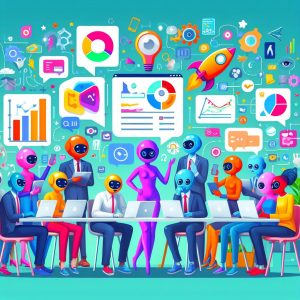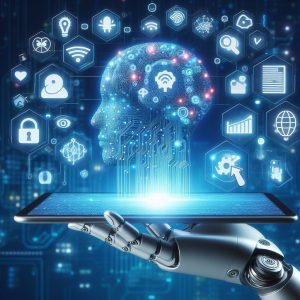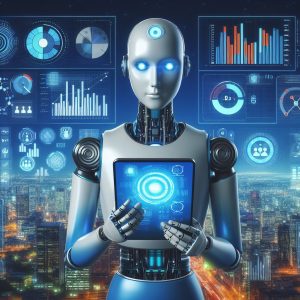Artificial intelligence (AI) is rapidly changing the way businesses interact with their customers. From chatbots to personalized recommendations, AI is being used to improve customer experience and build stronger relationships.
How AI is being used to improve customer experience
AI is being used to improve customer experience in a number of ways, including:
- Chatbots: Chatbots are AI-powered virtual assistants that can interact with customers in a natural way. They can answer questions, provide support, and even help customers make purchases.
- Personalized recommendations: AI can be used to track customer behavior and preferences, and use this information to generate personalized recommendations for products and services.
- Automated tasks: AI can be used to automate repetitive tasks, such as scheduling appointments or sending out emails. This frees up customer service representatives to focus on more complex tasks.
- Sentiment analysis: AI can be used to analyze customer feedback and identify trends. This information can be used to improve products and services, and to develop more effective marketing campaigns.
How AI is being used to build stronger customer relationships
AI is also being used to build stronger customer relationships. For example, AI can be used to:
- Identify at-risk customers: AI can be used to identify customers who are at risk of churning. This information can be used to target these customers with special offers or discounts, or to provide them with additional support.
- Segment customers: AI can be used to segment customers into different groups based on their demographics, interests, and behaviors. This information can be used to tailor marketing campaigns and product offerings to specific customer segments.
- Personalize marketing messages: AI can be used to personalize marketing messages for each individual customer. This can be done by using customer data to create targeted messages that are more relevant to the customer’s interests.
- Provide real-time support: AI can be used to provide real-time support to customers. This can be done through chatbots, email, or even social media.
The future of AI in marketing
AI is still in its early stages of development, but it is already having a major impact on the way businesses market their products and services. As AI continues to evolve, it is likely to play an even greater role in customer experience and relationship management.
Here are a few ways that AI could be used in marketing in the future:
- Predictive analytics: AI could be used to predict customer behavior and preferences. This information could be used to create more targeted marketing campaigns and product offerings.
- Personalized experiences: AI could be used to create personalized experiences for each individual customer. This could include personalized recommendations, discounts, and even products and services.
- Automated marketing: AI could be used to automate marketing tasks, such as creating and sending out marketing emails, scheduling social media posts, and tracking customer behavior. This would free up marketers to focus on more strategic initiatives.
AI has the potential to revolutionize the way businesses market their products and services. By using AI to improve customer experience and build stronger relationships, businesses can create a more loyal and profitable customer base.
The customer relationship management (CRM) field is undergoing a significant transformation driven by the rise of artificial intelligence (AI). While AI poses certain risks to CRM professionals, it also offers immense opportunities for enhancing customer experiences and streamlining operations. In this blog post, we will explore the potential dangers of AI for CRM roles, the likelihood of AI replacing these jobs, how AI can augment CRM functions, and strategies to adapt to the changing landscape.
Dangers for Customer Relationship Managers:
- Automatable Tasks:
AI-powered automation tools can perform repetitive and routine CRM tasks such as data entry, lead generation, and customer support, potentially leading to job displacement for CRM professionals.
- Diminished Human Interaction:
Overreliance on AI for customer interactions could reduce the personal touch and human connection that are crucial for building lasting relationships.
- Ethics and Bias:
AI algorithms can inherit and amplify biases, leading to unfair or discriminatory outcomes in customer interactions.
- Data Security and Privacy Concerns:
The integration of AI with customer data raises concerns about data security and privacy breaches.
- Algorithm Manipulation:
Customers may become aware of AI’s influence on their interactions, leading to distrust and a decrease in engagement.
Possibilities of AI Replacing CRM Jobs:
While AI can automate certain CRM tasks, it is unlikely to replace CRM professionals entirely. AI’s strength lies in its ability to analyze vast amounts of data, identify patterns, and make predictions, but it lacks the creativity, empathy, and problem-solving skills that human CRM professionals possess.
How AI will be used to help in the CRM job:
- Customer Segmentation and Targeting:
AI can help CRM professionals segment customers based on their preferences, behaviors, and demographics, enabling more targeted and personalized marketing campaigns.
- Predictive Analytics and Forecasting:
AI algorithms can analyze customer data to predict behavior, identify upselling opportunities, and forecast future trends, helping CRM professionals make informed decisions.
- Enhanced Customer Support:
AI-powered chatbots and virtual assistants can provide 24/7 customer support, answering common queries, resolving issues quickly, and escalating complex cases to human agents.
- Personalized Recommendations:
AI can track customer interactions, preferences, and purchase history to provide personalized product recommendations, improving customer satisfaction and driving sales.
- Sentiment Analysis and Feedback Collection:
AI-powered sentiment analysis tools can analyze customer feedback, social media sentiment, and online reviews to identify areas for improvement and enhance customer experiences.
Adapting to the Changing Landscape:
- Embrace Continuous Learning:
CRM professionals should embrace continuous learning to stay updated with emerging AI trends, technologies, and best practices.
- Develop Complementary Skills:
Focus on developing skills that complement AI’s capabilities, such as critical thinking, creativity, empathy, and strategic thinking.
- Collaborate with AI:
Rather than viewing AI as a threat, CRM professionals should collaborate with it to enhance their productivity, efficiency, and effectiveness.
- Leverage Data Analytics:
Gain proficiency in data analysis to interpret insights from customer data and make data-driven decisions.
- Cultivate Customer Advocacy:
Focus on building strong relationships with customers, providing exceptional service, and advocating for their needs, which AI cannot replicate.
Conclusion:
The rise of AI is transforming the CRM landscape, presenting both challenges and opportunities for professionals in this field. By embracing continuous learning, developing complementary skills, collaborating with AI, leveraging data analytics, and cultivating customer advocacy, CRM professionals can adapt to the changing landscape and thrive in the AI era.
Remember, AI is a tool that can augment human capabilities and enhance customer experiences when used strategically and ethically. The future of CRM lies in the harmonious coexistence of AI and human CRM professionals, working together to create value for customers and drive business growth.



